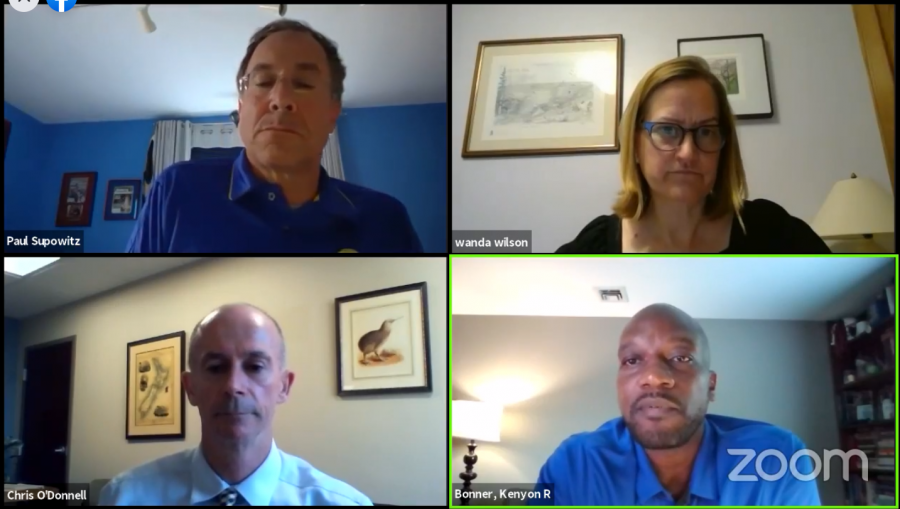Students, faculty and staff required to complete COVID-19 training for fall
Top Pitt officials discussed the University’s fall reopening plans during a Tuesday evening community meeting held by the Oakland Planning and Development Corp.
July 29, 2020
All students, faculty and staff will be required to complete COVID-19 training for the fall, according to Kenyon Bonner, the vice provost and dean of students.
Bonner and other top Pitt officials spoke to and answered questions from the Oakland community about fall reopening plans during a community meeting held Tuesday evening by the Oakland Planning and Development Corp. About 40 people attended the meeting, which took place over Zoom.
Though it was previously stated that all faculty and staff members would complete COVID-19 training, Bonner said during the meeting that all students will be required to complete the training as well. This comes days after Student Government Board president Eric Macadangdang announced that the University will update its Student Code of Conduct to issue sanctions to students who are not compliant with public health guidelines.
Bonner said students who do not comply with public health guidelines — including those set by state and local officials, as well as Pitt’s own rules — will be referred to the Office of Student Conduct and go through the conduct referral process.
“It is a due process that they are owed — they have a right to that — and if they are found responsible, there are consequences to their behavior,” Bonner said. “My hope and goal is that students will comply based on the culture that we’re setting and the understanding that their behavior impacts other people’s safety.”
Chris O’Donnell — a top official in Pitt’s COVID-19 Medical Response Office — also spoke at the meeting about Pitt’s plans for mitigating the virus and containing the virus if there is an outbreak. He said besides for de-densifying residence halls and requiring students to shelter-in-place before and upon arriving on campus, Pitt will run an “educational campaign” to encourage the University community to follow mitigation practices, such as wearing a face covering and social distancing.
O’Donnell said that although the University cannot truly control whether or not students follow the guidelines, he believes students are capable of making the right decision.
“Ultimately, the students have to take ownership of this. I think they know it’s in their hands if this campus remains open,” O’Donnell said. “If they come back and they’re not willing to partake in these activities and then there’s a large virus outbreak, they will go home. They have a vested interest in making this work.”
A July 20 email from the COVID-19 Response Office said the University is prepared to test 400 students daily to learn about the prevalence of the virus at the Oakland campus, as well as branch campuses. According to O’Donnell, this will consist of systematic, randomized testing of about 10% of the student body, equally divided between on- and off-campus residents, beginning on Aug. 11 when residence hall move-in begins.
He said Pitt is collaborating with UPMC to provide “rapid accuracy” tests, which can yield results in only 24 hours, as well as regular COVID-19 tests for symptomatic individuals.
Both O’Donnell and Bonner said there will be separate, isolation on-campus housing for those who test positive for COVID-19. When asked by community members where this housing will be located, they could not provide a specific answer, though they did say the housing will be spread across multiple buildings, one of which being a hotel used to house first-year students this fall.
Several community members expressed concerns about students potentially not following public health guidelines in their off-campus residences — specifically parties and large social gatherings — and inquired what they should do if they see things like this happening.
In response, Bonner said the Student Code of Conduct extends to off-campus students and said the University will not call the police as an initial response to public health incidents. Instead, he recommended that community members fill out the Environmental Health and Safety Office’s concern reporting form, and said the University will follow up with appropriate action.
“I am not going to tell you what to do as a community member in terms of calling the police. But we also recognize that there’s a lot of behavior we may not see in the Oakland community,” Bonner said. “If you see a party that’s happening, give us as much information as possible and we will follow up and do our due diligence and see if students are responsible for that.”








